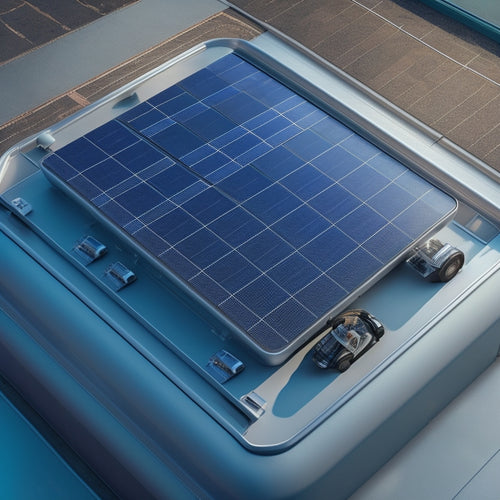
5 Essential Tips for Homeowners Going Green
Share
To improve the sustainability of your home, start by evaluating your energy efficiency through a thorough audit, identifying areas of heat loss and energy waste. Choose a reputable solar panel dealer with a proven track record and certifications. Understand local incentives and rebates, including the Solar Investment Tax Credit, to maximize savings. Optimize your home's energy usage by swapping bulbs, using Smart Plugs, and sealing air leaks. Finally, maintain your solar panel system through regular cleaning and inspections. By following these essential tips, you'll be well on your way to a greener home - and a deeper understanding of the journey ahead.
Key Takeaways
• Conduct a thorough energy audit to identify areas of heat loss and energy waste in your home.
• Choose a reputable solar panel dealer with experience, a good track record, and proper certifications.
• Research and take advantage of local incentives, rebates, and tax credits to maximize your savings.
• Optimize your home's energy usage by sealing air leaks, adding insulation, and using energy-efficient appliances.
• Regularly maintain your solar panel system to ensure peak performance and prevent energy output reduction.
Assessing Your Home's Energy Efficiency
Before diving into eco-friendly renovations, start by evaluating your home's current energy efficiency by conducting a thorough audit to identify areas of heat loss, energy waste, and opportunities for improvement. You'll be amazed at how much energy (and money) you can save by plugging those pesky energy leaks. An energy audit will help you pinpoint where your home is hemorrhaging heat, and provide a roadmap for future upgrades.
Insulation upgrades are a great place to start. You might be surprised at how much heat escapes through your attic, walls, and floors. By adding insulation, you can reduce heat loss in the winter and heat gain in the summer, saving you big bucks on your energy bills. Plus, it's an easy DIY project that'll pay for itself in no time.
Choosing the Right Solar Panel Dealer
With your energy-efficient home upgrade underway, now it's time to harness the power of the sun by installing solar panels, but first, you need to find a reputable dealer who can guide you through the process and guarantee a successful installation.
When selecting a solar panel dealer, beware of high-pressure sales tactics. You want a dealer who'll educate you on the best options for your home, not one who's solely focused on making a sale. Here are three essential factors to take into account:
-
Experience: How long has the dealer been in business? Do they've a proven track record of successful installations?
-
Warranty options: What kind of warranty does the dealer offer? Look for a thorough warranty that covers both the panels and the installation.
-
Certifications: Is the dealer certified by a reputable organization, such as the North American Board of Certified Energy Practitioners (NABCEP)? This guarantees they've the necessary expertise to install your solar panels correctly.
Understanding Local Incentives and Rebates
You'll be pleased to know that going green with solar panels can also bring some welcome financial rewards, courtesy of local incentives and rebates that can greatly offset the upfront costs of your eco-friendly upgrade. As a homeowner, you're likely eligible for various government-backed incentives designed to encourage the adoption of renewable energy sources.
For instance, the Solar Investment Tax Credit (ITC) allows you to claim a tax credit of up to 26% of the total cost of your solar panel system. Additionally, many states and local governments offer rebates, tax credits, or property tax exemptions to homeowners who invest in solar energy.
It's crucial to research and understand the specific government policies and tax benefits available in your area, as they can significantly reduce the financial burden of going green. By taking advantage of these incentives, you can enjoy a quicker return on your investment and start reaping the rewards of solar energy sooner.
Be sure to consult with a tax professional to maximize your savings.
Optimizing Your Home's Energy Usage
By pinpointing and addressing energy-wasting inefficiencies in your home, you can optimize its energy usage and create a solid foundation for your solar panel system to thrive. Think of it as a pre-game warm-up for your solar panels – you want to make sure your home is energy-efficient before bringing in the big guns.
To get started, consider conducting an energy audit to identify areas of improvement. This might involve hiring a professional to assess your home's energy efficiency or doing it yourself with a DIY energy audit kit.
Here are three ways to optimize your home's energy usage:
-
Swap out incandescent bulbs for LEDs: This one's a no-brainer – LEDs use considerably less energy and last way longer than traditional bulbs.
-
Use Smart Plugs to control standby power: Those pesky 'vampire' devices (think TVs, computers, and chargers) can still suck up energy even when turned off. Smart Plugs can help eliminate standby power waste.
-
Seal air leaks and add insulation: A well-insulated home is an energy-efficient home. Seal those air leaks and add some extra insulation to keep the warm air in and the cold air out.
Maintaining Your Solar Panel System
Your solar panel system is a significant investment, and regular maintenance is important to guarantee it operates at peak performance and lasts for years to come. Think of it like a car - you wouldn't drive it for years without changing the oil, would you? Similarly, your solar panels need a little TLC to keep generating clean energy efficiently.
Panel cleaning is an important part of maintenance. Dirt, grime, and debris can reduce your system's energy output by up to 25%! You can clean your panels yourself or hire a professional. Make sure to use a soft-bristled brush and a mild soap solution to avoid scratching the panels.
Regular system inspections are also necessary. Schedule annual checks to identify potential issues before they become major problems. A professional inspector will check for loose connections, corrosion, and signs of wear and tear. They'll also make sure your system is still meeting safety standards.
Frequently Asked Questions
Can I Install Solar Panels on My Roof if It's Shaded?
You can install solar panels on a shaded roof, but it's important to assess your roof's orientation and consider tree trimming to minimize shade's impact on energy production, ensuring peak panel performance.
How Long Does It Take to Pay off My Solar Panel Investment?
You're wondering when you'll break even on your solar panel investment, right? The answer depends on your Solar Savings, but generally, it takes 5-7 years to pay off, with an Investment Timeline that varies based on local incentives and energy costs.
Are Energy-Efficient Appliances Worth the Extra Cost?
When considering energy-efficient appliances, you'll find they're worth the extra cost since they provide long-term Energy Savings and Appliance Durability, making them a smart investment for your wallet and the planet.
Can I Sell Excess Energy Back to the Grid?
You're wondering if you can sell excess energy back to the grid? Absolutely! With net metering, you can feed excess energy back into the grid, and when you reach grid parity, you'll be generating as much as you consume, and even getting credited for it!
Do Solar Panels Work During a Power Outage?
During a power outage, your solar panels won't work without backup systems, but with energy storage, you can store excess energy for later use, ensuring you're not left in the dark - literally!
Related Posts
-

Top Solar Panels for Car Battery Maintenance
When selecting top solar panels for car battery maintenance, consider high-efficiency models with high wattage output...
-

Top 7 Portable Solar Car Battery Solutions Online
You're in luck with our selection of reliable portable solar car battery solutions that meet your needs and budget. O...
-

10 Tips for Cleaner City Air With Scooters
By adopting a few simple habits, you can make a significant impact on reducing city air pollution with your scooter. ...


